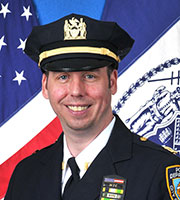Brooklyn's 78th Precinct has developed a well-earned reputation for taking street safety seriously, but it wasn't on display at last night's precinct community council meeting, where local residents grilled police on the death of cyclist James Gregg last Wednesday and the lack of truck route enforcement in Park Slope.

Deputy Inspector Frank DiGiacomo, the precinct's commanding officer, and Wayne Bailey, who serves in the volunteer position of precinct community council president, spent the meeting deflecting responsibility from the precinct and pointing fingers elsewhere.
A week ago, a big-rig driver struck and killed the 33-year-old Gregg on Sixth Avenue near Sterling Place, which is not a truck route. At the crash scene, officers blamed Gregg, telling passersby that he had been hanging onto the side of the truck’s trailer.
An initial NYPD statement on the crash said "no criminality" was suspected on the part of the truck driver, and that Gregg had "collided into [the] rear tire of the tractor trailer." A second police statement said the truck driver overtook Gregg and "something like a wind force... sucked the bicycle toward the back of the truck." The day after Gregg’s death, the department said that “for unknown reasons [Gregg] fell to the ground and was struck by the rear passenger tires of the tractor-trailer,” issuing five summonses to the driver for going off-route and various equipment violations.
It's not unusual for police officers to jump to conclusions and erroneously blame victims for their own deaths. Gregg’s death occurred less than a week after police claimed Lauren Davis was biking against traffic on Classon Avenue when she was struck and killed by a turning driver. A witness who saw Davis traveling in the direction of traffic has since upended NYPD's initial account.
Attendees at last night’s community council meeting chastised DiGiacomo for the false information that came out in the immediate aftermath of the crash that killed Gregg. When questioned about what the precinct could do to hold dangerous drivers accountable, DiGiacomo argued that the responsibility for investigating violent crashes lies with Highway Patrol. “It’s a highway investigation. Somebody died, they’re the professionals. It’s up to them,” he said.
Crash investigations are conducted by the Crash Investigation Squad, which, as DiGiacomo said, is part of the Highway Patrol. But precinct officers also respond to crash scenes, and it was an officer with the 78th Precinct who was telling passersby that Gregg had been hitching a ride on the side of the trailer. DiGiacomo asked for the officer's name but gave no indication he would take steps to prevent victim-blaming conjecture at crash sites in the future.
The 78th Precinct only issued five truck route citations last year, and at the time Gregg was struck and killed, it had issued none in 2016. Then, following the crash, officers were seen ticketing off-route truck drivers.
When Park Slope Neighbors’ Eric McClure asked how the precinct will sustain the truck route enforcement it conducted after the crash, DiGiacomo's answers were vague. For the most part, he was silent during the meeting, and Bailey, a volunteer civilian, did most of the talking.
There was no discussion of how the 78th can coordinate with other branches of NYPD and other public agencies to improve truck enforcement, with Bailey saying the precinct's hands are tied.
Bailey said he has been working for years to get trucks off the area’s residential streets, and that the 78th Precinct has been eager to assist him. “I have been complaining about surface trucks forever, being in the neighborhoods, being on Atlantic, and it’s all because of toll shopping,” he told the audience. “I have been a street safety person forever, I don’t cut any slack to anybody, and the 78th has always been helpful to us.”
“I guess I hold you guys to a higher standard because I’m familiar with the work you’ve done,” McClure said in response.





